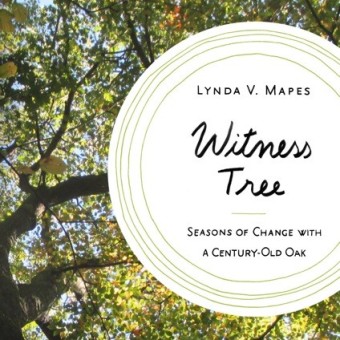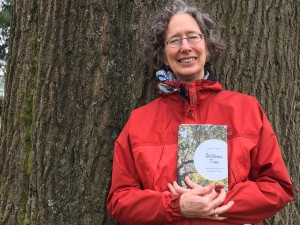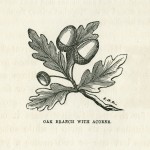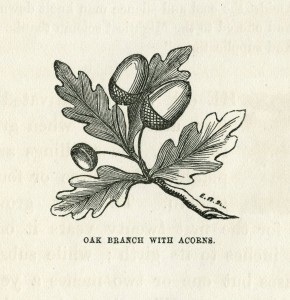About the Book — now out in paperback


Now out in paperback! Published by the University of Washington Press
About the Witness Tree Project | Pre-Order the Book | Praise for the Book | Events
Buy the Book
Witness Tree, on TV. An interview with Q13 Fox
https://www.youtube.com/watch?v=IGeJiDTgbdI
Praise for the Book
“Lynda V. Mapes adopts a narrower lens but is equally ambitious in Witness Tree, which gets at sweeping ideas by looking at one century-old oak tree in Massachusetts. Among many other subjects–forest regeneration, acorn production, pollen records–Mapes has plenty to say about our early spring(s). ‘Climate change, the trees, streams, and puddles, and birds, bugs, and frogs, attest, is not a matter of opinion or belief,’ she writes. ‘It is an observable fact.'” – New York Times Book Review
“A meticulously, beautifully layered portrayal of vulnerability and loss, renewal and hope, this extensively researched yet deeply personal book is a timely call to bear witness and to act in an age of climate-change denial.” – starred Review, Kirkus Reviews
“Mapes writes of her time in the woods with such genuine wonder and delight that what emerges is an unlikely love story about a reporter and a tree . . . What makes Witness Tree such an irresistible read is Mapes’s love of language combined with a great talent at rendering nerdy information readable.” – The Los Angeles Review of Books
“For those with an abiding fondness for New England farmsteads and woodlots, Mapes offers up literary comfort food, as welcome as hot cocoa on a chilly day . . . To walk with Mapes through these pages is not only to enjoy the charm of rural New England, but also to experience the global effects of our civilization–for better and for worse–on an intimate scale.” – Natural History Magazine
“The Harvard Forest is a center for the scientific study of climate change, but also–as this deep book makes clear– for what you might call the philosophic and historical inquiry that we should be making into this most crucial of topics. Lynda Mapes has managed to find a new and intriguing way into this question, and her book will be read with great profit by a great many.” – Bill McKibben, author EAARTH: MAKING A LIFE ON A TOUGH NEW PLANET
“Mapes chronicles how this ‘witness tree’ both mirrors and is shaped by our changing, warming world. Lyrical, engaging, and wise, Mapes invites us to understand trees as individuals rather than a collective forest. This is compelling storytelling and natural history that, like our elder trees, is both enduring and inspiring.” – Brenda Peterson, Brenda Peterson, WOLF NATION: THE LIFE, DEATH, AND RETURN OF WILD AMERICAN WOLVES
“Mapes’ vivid language immerses us in the grand world of one esteemed red oak. Witness Tree is a splendid story that enriches our view of nature and ourselves.” – David R. Montgomery and Anne Biklé, authors, THE HIDDEN HALF OF NATURE
Witness Tree is getting great press across the country. Great trees make great stories!
Here’s a terrific review on August 29, 2017 by Joy Horowitz in the Los Angeles Review of Books
To quote from it just a little…
“What makes Witness Tree such an irresistible read is Mapes’s love of language combined with a great talent at rendering nerdy information readable. Mapes writes of her tree with a poetry that is beholden to more than science:
We discovered it gifts a hail of acorns to birds, squirrels and deer mice. It shelters garter snakes, ants, black flies, ferns and lichens. It creaks from cold in frozen nights with snow deep all around. And its bare limbs are beautifully seen in winter against distant galaxies of sharp burning stars.”
Thanks to Sam Hankin of WCHE 1520 AM’s Avid Reader for this great new podcast on Witness Tree put up on May 17. Sam is the manager of Wellington Square Books in Philadelphia, a gorgeous independent book store. He was a prepared, smart, questing interviewer who created a lively, interesting new take on the book. Give it a listen!
Thanks to Diane Horn of KEXP in Seattle for this podcast on Witness Tree. Thoughtful, insightful, in-depth coverage of the book.
Thanks also to Carrie Healy for her wonderful story on New England Public Radio about Witness Tree. We walked up to the tree together and had a great talk about what was so special about getting to know one tree so well, and exploring climate change from an entirely new angle. Full of laughter and joy, she was a reporter who clearly got the unique setting of the Harvard Forest and the message of the book. What a pleasure to spend that time together.

Carrie Healy of New England Public Radio interviewing me by the big oak at the Harvard Forest, web cams at our feet. Photo by Doug MacDonald
Here is the cover story in the Boston Sunday Globe Magazine, Sunday, April, 30.
And thanks to Warren Olney and the crew at the national radio show To the Point on KCRW for their show April 28 on Witness Tree. So great to go on the air and talk about this beautiful tree, and what it tells us about climate change.
Here is a magazine piece I wrote about the book in the Pacific Northwest Magazine, the Sunday magazine of the Seattle Times.
Natural History Magazine gave Witness Tree a great review.
Bellamy Pailthorp of Seattle public radio KNKX did a terrific story on Witness Tree on April 11, publication day, recorded underneath the spreading boughs of a grand old oak at Seattle’s Volunteer Park. She took great pictures, too! Thank you, Bellamy for permission to use them.

It’s publication day for Witness Tree. Celebrating with The Queen, a massive red oak at Seattle’s Volunteer Park. Photo by Bellamy Pailthorp of Radio KNKX
And here is a terrific review published April 10 from Joel Connelly of the Seattle Post-Intelligencer:
“Witness Tree”: An engrossing book on what a tree teaches us…
And how fun to open the New York Times Book Review March 17 and find these nice words for Witness Tree:
“Witness Tree…gets at sweeping ideas by looking at one century-old oak tree in Massachusetts. Among many other subjects — forest regeneration, acorn production, pollen records — Mapes has plenty to say about our early spring(s). “Climate change, the trees, streams, and puddles, and birds, bugs, and frogs, attest, is not a matter of opinion or belief,” she writes. “It is an observable fact.”
And then another review in the New York Times in May:
The intriguing, and more intimate, WITNESS TREE: Seasons of Change With a Century-Old Oak (Bloomsbury, $27), by Lynda V. Mapes, portrays trees as “scribes, diarists, historians.” They are “among our oldest journalists.” A reporter herself, covering environmental issues for The Seattle Times, Mapes sets out to tell the story of climate change through one tree. But that is, marvelously, the least of it.
She finds her oak in the Harvard Forest in Massachusetts and spends a year with it, telling of the farm on which it grew, twisting up out of a stone wall, and drawing forth people devoted to befriending and studying trees. They are the tree’s interpreters. Bob Leverett, a former Air Force engineer and a “committed big-tree hunter,” arrives to take measurements and tells Mapes, “I need trees for my emotional stability and health.” He bemoans all we have lost in the destruction of ancient forests: “We have robbed a species of its dignity.”
Mapes is a graceful writer. She describes “the quiet finesse” of a tree; “the fructifying funk” at the base of an oak; the “wand of time” that is a core sample drilled out to ascertain age; the “choring and the weariness” in the diary of a 19th-century farmer’s wife; a spider that has “rappelled gracefully” off her glasses. She is spending so much time with her tree that it’s becoming a part of her; she sheds it only when she goes indoors at night.
As for the vexing (if not terrifying) prospect of global warming, there’s no question in any gardener or farmer or arborist’s mind: Leaf-out starts earlier than ever before and first frost comes later as average temperatures rise steadily across the land. This isn’t a matter of belief; it’s observable fact. With that change in rhythm, and a weather system on steroids, come a host of problems. As Mapes puts it: “Leaves don’t lie; frost isn’t running for office; frogs don’t fund-raise; pollinators don’t put out press releases.”
The natural world is an unimpeachable witness, and we would be wise to heed its testimony. “We are not separate from nature,” Mapes writes, and in this she echoes what the artists and scientists and gardeners are telling us too. “We are of it, and in it, and we need an ethical framework to match.”
The book launches for Witness Tree — all three, each different –– were spectacular! Joyful, packed, fun.
I’m still glowing from the launch April 11 in Seattle at our beautiful downtown public library, co-presented by the Elisabeth C. Miller Library of the University of Washington Botanic Gardens and the School of Environmental and Forest Sciences at the College of the Environment at the University of Washington.
Then back east, I launched Witness Tree at the Harvard Forest May 2 and the Arnold Arboretum on May 5. Glorious events, both!
Reviews also have been so gratifying! To get it all started, Witness Tree received a starred review in the Feb 15 issue of Kirkus Reviews!
“A textured story of a rapidly changing natural world and our relationship to it, told through the lens of one tree over four seasons.Seattle Times environmental reporter Mapes (Breaking Ground: The Lower Elwha Klallam Tribe and the Unearthing of Tse-whit-zen Village, 2015, etc.) first encountered the Harvard Forest as a Knight Science Journalism Fellow, returning soon afterward for a yearlong stay in the woods. Renting a room in a historic farmhouse, she sought out a majestic century-old oak to serve as her lens from which to explore the past, situate the present, and grapple with an uncertain future. Aided by a colorful team of interdisciplinary experts, Mapes tells a dynamic story from multiple perspectives, including from a hammock in the canopy of the tree. Understanding trees simultaneously as utility and commodity, as ritual and relic, as beings with agency and sustainers of life, the author illustrates how they have found their ways into our homes and memories, our economies and language, and she reveals their places in our entangled future. Seamlessly blending elements of physics, ecology, biology, phenology, sociology, and philosophy, Mapes skillfully employs her oak as a human-scaled entry point for probing larger questions. Readers bear witness to indigenous histories and colonialism, to deforestation and extraction, to industrialization and urbanization, and to the story of carbon and the indisputable realities of human-caused climate change. Understanding these phenomena to be intricately interconnected, the author probes lines falsely drawn between objectivity and emotion and between science and wonder, all while examining the nature of knowledge and the possibilities, tensions, and limitations of science. Passionately discrediting the notion that humans and nature are separate, she links this flawed belief to the root of our current ecological crisis and calls for a reimagining of the ways of being together in the world. A meticulously, beautifully layered portrayal of vulnerability and loss, renewal and hope, this extensively researched yet deeply personal book is a timely call to bear witness and to act in an age of climate-change denial.”
I was also honored to receive terrific blurbs for the book from leading climate scientists and observers as well as some of our most celebrated forest ecologists on both coasts:
“The Harvard Forest is a center for the scientific study of climate change, but also–as this deep book makes clear– for what you might call the the philosophic and historical inquiry that we should be making into this most crucial of topics. Lynda Mapes has managed to find a new and intriguing way into this question, and her book will be read with great profit by a great many.”
—Bill McKibben, author Eaarth: Making a Life on a Tough New Planet, Schumann Distinguished Scholar, Middlebury College
“Imagine discovering a cascade of clues to what a big tree has witnessed, and recorded. Peering deeply into a world-class research forest, the author joins ecologists at work with nature and instrument. She reads us the tree’s diary, its soft rhythms of daily life enriched by seasons and surprises. Dramatic land-use changes, forest convulsions, even changing climate produced a sturdy survivor. Suppose we all adopt a tree, or shrub or bird, to treasure. Create an ethic that alters history.”
—Richard Forman, Research Professor of Advanced Environmental Studies, Harvard University
“Growing up devoted to the “kingdom of trees,” the award-winning Seattle Times environmental reporter, Lynda Mapes, returns to her East Coast roots to ruminate on the long life of one ancient oak tree in the Harvard Forest. Mapes chronicles how this “witness tree” both mirrors and is shaped by our changing, warming world. Lyrical, engaging, and wise, Mapes invites us to understand trees as individuals rather than a collective forest. This is compelling storytelling and natural history that, like our elder trees, is both enduring and inspiring.”
—Brenda Peterson, Wolf Nation: The Life, Death, and Return of Wild American Wolves
“Lynda Mapes reminds us what a magnificent thing a tree is. In beautifully crafted prose, she tells us the fascinating story of trees and how they bear witness to their natural neighborhood, to changing seasons and to our warming climate. These quiet sentinels, all around us, tell compelling stories, and we would be wise to listen.”
—Kerry A. Emmanuel, Prof. Atmospheric Science, M.I.T.
“Mapes’ vivid language immerses us in the grand world of one esteemed red oak. Witness Tree is a splendid story that enriches our view of nature and ourselves.”
—David R. Montgomery and Anne Biklé, authors, The Hidden Half of Nature
“The real witness in Witness Tree is Lynda Mapes, who during a year at the Harvard Forest meets a cadre of people who are unraveling the forest’s wonderful secrets and how those are being impacted by climate change. This rich, engaging book should be in the hands of anyone interested in forests and the amazing stories they have to tell.”
—Tom Wessels, author of Forest Forensics and Reading the Forested Landscape and a professor emeritus at Antioch University
“As human-caused climate change continues to accelerate Witness Tree arrives with an ambitious aim—to mend the tattered bond between human and nature by deeply engaging with a single “big oak” and the ecology of life it harbors. With delightful prose full of wonder Lynda Mapes honors specialized knowledge (science and history) alongside citizen science, inspiring and empowering us all to take part in healing the earth. Witness Tree is a momentous guide for our rapidly changing time.”
—Subhankar Banerjee, Lannan Chair and Professor of Art and Ecology, University of New
“A thorough and joyful exploration of the richness and complexity of forest ecosystems… Highly recommended for all lovers of natural history and forest science.”
– Jerry F. Franklin, Professor, University of Washington.
Paperback Launch Events, 2019
September 18
Author reading and signing, 7 pm
Madison Books
4118 E Madison St., Seattle, WA 98112 19
September 19
Author reading and signing, 7 pm
Third Place Books 6504 20th Ave NE Seattle WA 98115
September 22
Lecture, 5 pm
Blom Lecture, Women’s University Club
The writer’s stance: how to write literary non-fiction
1105 Sixth Avenue in Seattle.
October 8
Author reading and signing, 6 pm
UW Book Store, University District
4326 University Way, N.E.




